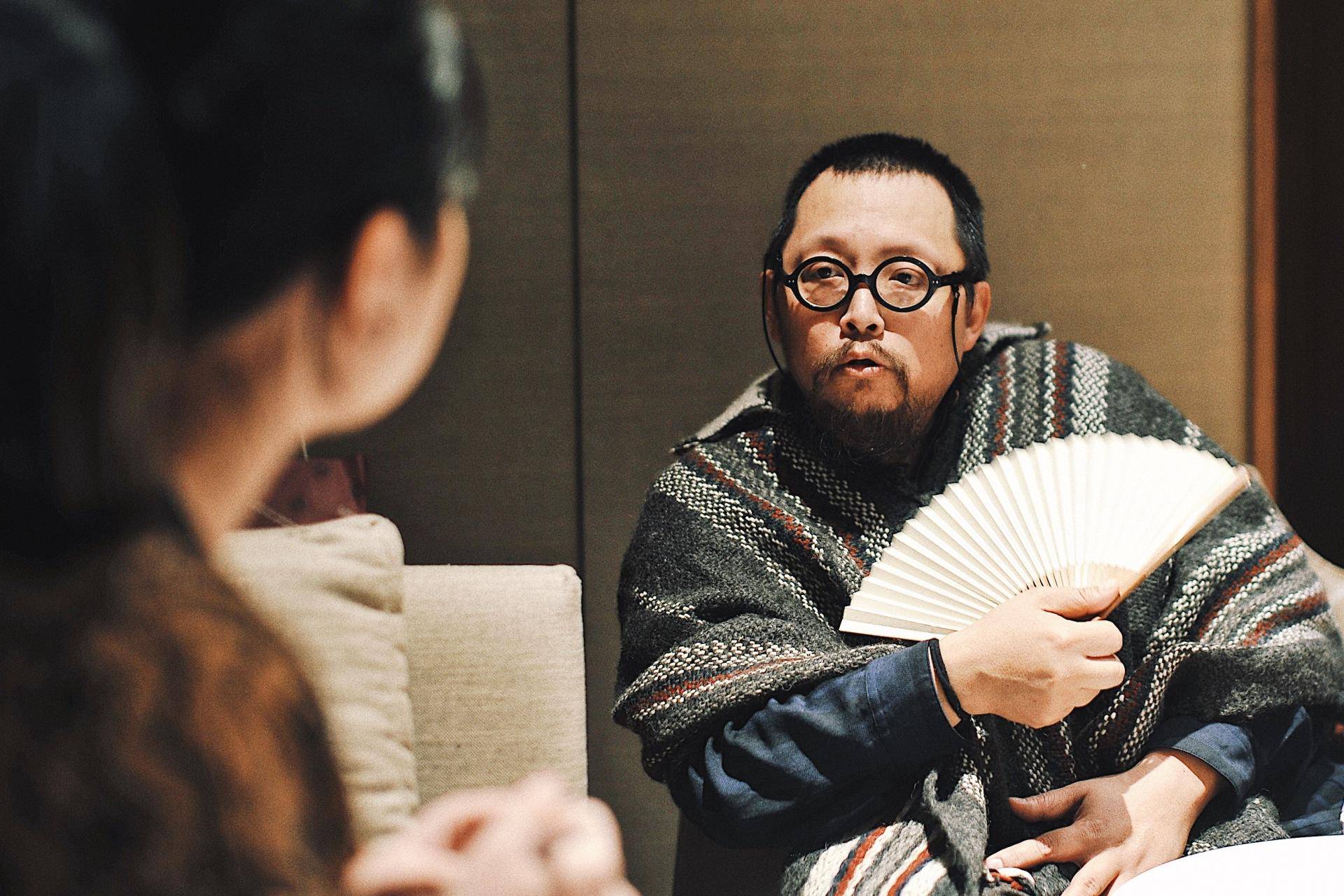Screenwriter hit with #MeToo allegations, igniting debate in China about ‘gray areas’
Allegations of inappropriate behavior in Shi Hang's interactions with coworkers and fans contrast with his public reputation as an ally for women’s rights. In social media posts defending himself, Shi claims that the flirtatious encounters are consensual.

China’s embattled #MeToo movement, which had been dormant after a recent string of setbacks, has reawakened this week as more than a dozen women have come forward with accusations of sexual harassment against an influential screenwriter and media personality.
The scandal has been trending on Chinese social media, triggering a groundswell of outrage and heated discussions about sexual misconduct in situations involving power dynamics — and “gray area” behavior, such as making raunchy jokes or flirtatious compliments.
At the heart of the controversy is Shǐ Háng 史航, 52, a famous writer and producer who has credits on an extensive list of drama series, plays, and TV programs. Shi has responded to the allegations, claiming that the encounters were all consensual.
Power dynamics and unwanted advances
The scandal broke on April 28 when an anonymous user on Douban, a Chinese social platform with a book and movie review focus, shared a now-deleted post alleging that Shi verbally and physically harassed her when they hung out at his place after they exchanged contacts at a film festival in 2019. The alleged victim said she sternly turned down Shi’s advances at the moment, prompting him to apologize profusely and try to excuse himself by saying that he “couldn’t resist the temptation,” the woman wrote, stressing that she had proof to support her claims.
The allegation quickly gained attention on the Chinese internet and snowballed into a full-blown scandal, with more than a dozen women coming forward to describe a pattern of nonconsensual touching and inappropriate remarks by a man they once considered an admirable figure in the Chinese entertainment and literary industries.
The majority of the alleged victims are fans of Shi or crossed paths with him in the workplace. The accusations span more than a decade, with the most recent happening just a few weeks ago. In one account, an unnamed reporter said that after she met Shi for an interview, he kept sending her unsolicited lewd messages and groped her on various work-related occasions. In another account, a longtime fan of Shi’s accused him of making uninvited sexual advances on her at a theater festival in 2017. “I was a fresh graduate back then and I had so much admiration and respect for Shi because of his influence in the art and literary world,” the person wrote. “That encounter has severely impacted how I interact with male bosses and made me nervous and anxious when I talk to them.”
One of the accusers claimed that Shi offered her a ride home after they met at a book event about a decade ago. She recalled that she was wary at first but decided to accept the offer after Shi told her that he was “a famous gentleman in his circle of friends.” But her trust was soon betrayed when Shi touched her without consent in the car. “He stuck his tongue in my ear and that’s a detail I still remember vividly till this day,” the woman wrote.
A graduate from the prestigious Central Academy of Drama in Beijing, Shi has been an influential figure in the Chinese TV and theater world for nearly three decades. He first gained recognition as a screenwriter for co-writing The Eloquent Ji Xiaolan (铁齿铜牙纪晓岚 tiě chǐ tóng yá jìxiǎolán), a massively popular television series that aired in China from 2001 to 2009 with four seasons. He is also a prolific playwright, book reviewer, and film critic, who in recent years has appeared in multiple variety shows as a special guest.
The controversy has put a specific book recommendation made by Shi under scrutiny. On Sunday, Xiron, a Beijing-based publishing house, announced that it would remove an endorsement by Shi for Fang Si-Chi’s First Love Paradise (房思琪的初恋乐园 fáng sī qí de chūliàn lèyuán), a powerful novel by Taiwanese author Lín Yìhán 林奕含 in which she tells a chilling tale of pedophilia and sexual violence based on her own story and examines the long-term psychological harm caused by it.
“Having gone through our perilous teenage years, we are all survivors of our adolescence,” Shi wrote in a blurb for the book, which caused shockwaves in Taiwan when it was published in 2017 and later become a catalyst that sparked the island’s #MeToo movement. The author, who took her own life shorty after making her literary debut, has been considered a feminist icon in the mainland, with many women referencing her work and describing her as a source of inspiration in their #MeToo stories.
As the accusations piled up and a growing list of publications, including Guangzhou-based magazine New Weekly, cut ties with the screenwriter, Shi first issued a classic non-apology on May 1, saying that he was sorry to the women who felt hurt by his behavior. “I’m aware of the stories about me online. I understand the sentiment but what they said isn’t factual,” he wrote on Weibo, where he has more than 3 million followers. “My real failure is making women I know feel this way.”
Unsatisfied with the response, five of the accusers released a joint statement on Tuesday, stressing that because power dynamics were at play in the encounters they described, they were put in a vulnerable position where they felt reluctant to speak up when Shi sexually harassed them.
“It’s worth noting that in many of these cases, Shi Hang’s relationship with the accusers was like an opinion leader and his fan, a special guest and a staff member, a veteran in the industry and a newbie. There’s a clear imbalance of power,” they wrote, while encouraging more women with similar experiences with Shi to come forward.
In a more aggressive denial of the claims, Shi hit back at the accusers on Tuesday, saying that he had “varying degrees of” interactions with them, including some stable, consensual romantic relationships.
“I have never violated the wishes of women, nor have I used my so-called powerful position to violate anyone,” he wrote on Weibo. The post is accompanied by a string of screenshots, which seemingly show that some of his flirtatious messages and lewd jokes on WeChat were reciprocated, or at least tolerated, by the accusers.
On Weibo, where multiple related hashtags have racked up millions of views, Shi’s rebuttal has largely been deemed a failure, with many criticizing him for being oblivious to the systemic problem of sexism and misogyny and how difficult it is for women to navigate complex circumstances that involve sexual misconduct and power imbalances.
“His remarks indicate that not only he is ignorant about the definition of sexual harassment, of the power imbalance between him and these women (most of them young women and looking up to him), but he utilizes the power imbalance to construct a ‘love story’ that erases the exploitative nature of these encounters,” Stephanie Yingyi Wang, an assistant professor of gender and sexuality studies at St. Lawrence University, who has written extensively on LGBTQ and feminist activism in China, told The China Project.
A “gray area”?
Shi also has his defenders. Some internet users came to Shi’s defense, arguing that sending flirtatious messages to one’s love interest shouldn’t be considered a form of sexual harassment, and that it falls in “gray areas” of inappropriate behavior. Some said that the fact that the accusers didn’t block Shi immediately meant they were complicit in those situations.
These comments, said Wang, are indicative of a larger pattern of sexual harassment and assault in the Chinese workplace. “We need to understand the concept of the workplace with a broader framework, as it constitutes the ‘circles,’ ‘networks,’ and ‘connections’ that Chinese people value. For the cultural circles, Shi Hang has more connections and resources than these women,” Wang said.
As news of Shi’s #MeToo moment spread, another rude awakening played out on Chinese social media. When women took to Weibo to share their own everyday experiences — putting up with or faking delight at a man’s inappropriate behavior out of fear of retaliation — the hashtag #黄色笑话是一种服从性测试# (Raunchy jokes are a test of obedience) began to trend, with some men joining in to express surprise at these revelations.
According to Sara Liao, an assistant professor of media studies and Asian studies at Pennsylvania State University, although the difficulty of speaking out against sexual harassment is a worldwide phenomenon, Chinese women face an extra array of hurdles that prevent them from coming forward.
For them, “seeking proper legal procedures for justice and the process of reporting it to the police are torture in many different ways,” said Liao, who is currently researching and writing about the feminist movement in China and activism against sexual harassment, sexism, and misogyny. “And it is all too easy to hear slut-shaming of the victims, particularly with the convenience of one click on the internet (you can easily name many examples).”
“Moreover, many victims also might not understand that the experiences they had are ‘sexual harassment/assault/rape,’ but might mistake them as romantic engagements on top of gaslighting and manipulation,” she added. “So the debates online about those who spoke up about Shi’s sexual misconduct/harassment/assault might not be so surprising. But to criticize these women, who accused Shi, complicit in these harassments is another trap of slut-shaming and victim-blaming.”
Shi’s scandal is the latest in a recent spate of high-profile #MeToo cases that have rocked China’s literary and publishing industry. Last week, Fàn Xīn 范新, founder of Folio, a Beijing-based independent publisher famous for celebrating female authors, was accused of attempting to sexually assault an employee on a business trip. A few days later, Zōng Chéng 宗城, a 26-year-old author and podcaster who has won several literary awards, was forced to take a hiatus from social media and promised to work on himself after several women publicly accused him of inappropriate behavior.
While the #MeToo movement has had some notable victories since it first emerged in China in 2018, including the imprisonment of Chinese-Canadian pop star Kris Wu (Wú Yìfán 吴亦凡) and a a nationwide reckoning about sexual harassment, Chinese feminists have struggled to keep the momentum going in the past year. Last summer, a Beijing court rejected an appeal by Zhōu Xiǎoxuán 周晓璇 (also known by the pseudonym Xiánzǐ 弦子), putting an end to her long-running landmark #MeToo case against prominent state television presenter Zhū Jūn 朱军.
It’s encouraging, said Wang, to see that Shi’s scandal has rejuvenated a public discourse around sexual harassment and definitions of boundaries in the workplace. “The fact that so many women chose to stand up and collectively expressed their grievances is a sign that the #MeToo movement in China is still ongoing, even though it’s censored and controlled,” she said.






